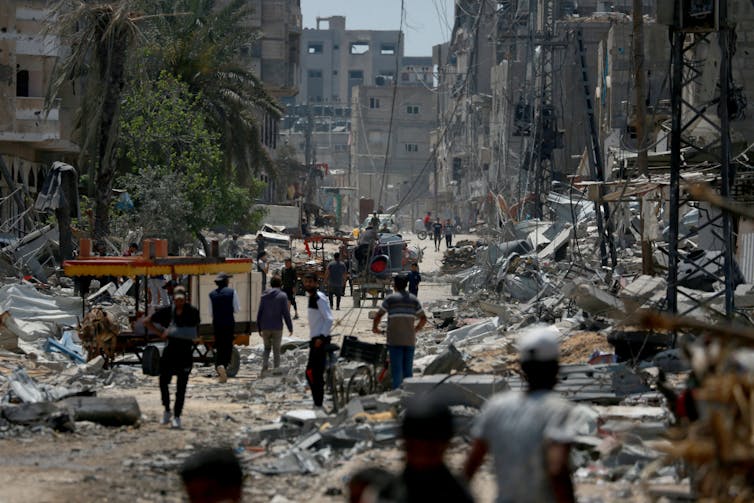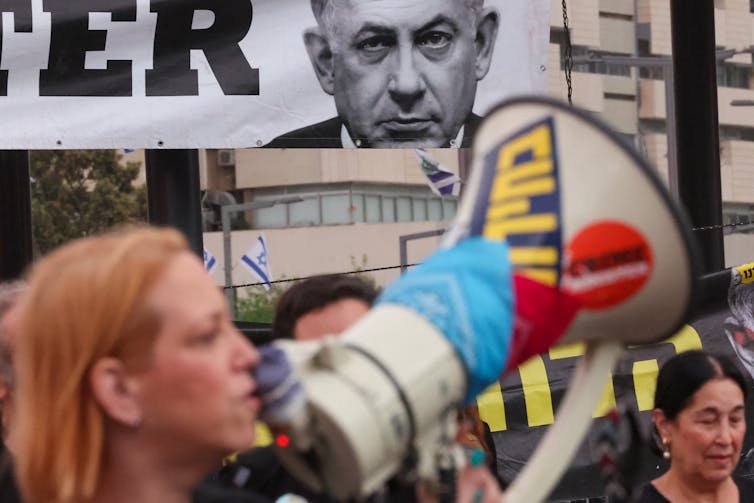The International Criminal Court issued arrest warrants on Nov. 21, 2024, for Israeli Prime Minister Benjamin Netanyahu, his former defense minister and one leading Hamas official. Those named in the action are accused of war crimes and crimes against humanity relating to the Oct. 7, 2023, attack by the Palestinian militant group and the subsequent ongoing siege and bombing of Gaza by the Israel Defense Forces.
In May 2024, ICC Chief Prosecutor Karim Khan sought arrest warrants for three senior Hamas leaders, accusing them of extermination, murder, taking hostages and committing rape and other acts of sexual violence. Two of those Hamas leaders, Yahya Sinwar and Ismail Haniyeh, have since been killed by Israeli forces. It has been reported that a third leader, Mohammed Deif, had also been killed by Israeli forces in August. But the ICC Pre-Trial Chamber still issued an arrest warrant for Deif, explaining that his death has not been confirmed.
Allegations against Netanyahu and former defense minister Yoav Gallant include starving Palestinians in Gaza, “intentionally directing attacks against a civilian population,” as well as persecution and “willful killing.”
The ICC, an independent tribunal based in The Hague, Netherlands, prosecutes genocide, crimes against humanity and war crimes – the latter being a legal term that includes attacking civilians and committing other wartime violations, such as blocking humanitarian aid.
The arrest warrants, which the Israeli government in a statement rejected “with disgust,” mean, in theory, that those accused could face arrest should they travel to one of the ICC’s 124 member states. Israel is not a member state of the court, but the “State of Palestine” has been a party to the Rome Statute, which set up the court, since 2015.
As a scholar of human rights and international courts, I think it is important to emphasize that the arrest warrants do not mean that those accused will necessarily face arrest or trial.
The ICC, in line with other contemporary international criminal tribunals, lack any enforcement powers of their own. That means in the Israel-Hamas situation, the ICC may never be able to arrest suspects or bring them to trial.
These international courts therefore have a mixed record of holding senior political and military leaders accountable for their crimes. It’s only if and when political leaders fall from power that there is any chance that their governments will arrest and hand them over to international courts for prosecution.

The challenge for international courts
Take the example of Russian President Vladimir Putin, who, since March 2023, has defied an ICC arrest warrant for allegedly committing war crimes during the Ukraine war. As long as Putin remains in power, there is practically no prospect of his arrest.
International criminal tribunals such as the ICC have a twofold problem. First, these tribunals do not have an actual international police force to carry out arrests.
Second, governments implicated in their leaders’ alleged crimes often try to obstruct international tribunals by not turning over suspects and by seeking to attack the tribunals as biased.
The enforcement problem, as my scholarship has shown, can allow the leaders of a powerful country such as Israel or an entity like Hamas to evade arrest warrants from international courts – as long as the suspects remain within their country or territory.
Because Israel is not an ICC member state, it never agreed to abide by court rulings or arrest warrants and does not otherwise accept the court’s jurisdiction. The U.S. and other countries, including Qatar, which in recent years has hosted a number of senior Hamas members, are also not ICC members and do not face a legal obligation to make arrests.
As such, Netanyahu and Gallant could still travel to meet with U.S. leaders in Washington, D.C., without fear of arrest. But they will now likely avoid travel to European Union countries, all of which are part of the ICC and would be obliged to arrest Netanyahu.
All of this may also contribute to Israel’s further international isolation and pressure over its wartime conduct.
Issuing arrest warrants for the Hamas leaders also threatens to stigmatize Hamas internationally.
The U.S., which at times has strongly opposed the ICC but has also supported the court on an ad hoc basis, as has happened in the ICC’s Ukraine situation, has previously warned that issuing arrest warrants for Israeli leaders could compromise a potential cease-fire agreement between Israel and Hamas.
Milosevic’s fall from power
Not all arrest warrants fail.
The trial of Serbian leader Slobodan Milosevic in the mid-2000s illustrates how international tribunals might be able to prosecute alleged war criminals once they fall from power.
In 1993, as the war in Bosnia was still being fought, the United Nations Security Council set up a special court, called the International Criminal Tribunal for the former Yugoslavia, to address crimes committed during the regional wars.
This court indicted Serbian nationalist leader Slobodan Milosevic for war crimes and crimes against humanity in 1999 during the ongoing Kosovo war. Milosevic’s alleged crimes in Kosovo included a massive ethnic-cleansing campaign waged against Kosovar Albanians, the largest ethnic group there. Milosevic later faced additional charges for alleged crimes in Bosnia and Croatia.
But Milosevic was still in power when the indictment was issued, and his government shielded him from arrest. Milosevic lost a presidential election in late September 2000 and, after widespread protests, stepped down.
The U.S. promised the new democratic government in place in Serbia substantial economic assistance to speed its postwar recovery. This helped prompt the Serbian government to arrest Milosevic and then transfer him to the the international tribunal in June 2001.

A potential playbook for Israeli leaders
Milosevic’s trial was launched in February 2002, but he died in prison in 2006, shortly before the end of his trial.
His trial still shows that under specific circumstances, international courts can overcome their lack of enforcement powers and bring high-level suspects to trial. International political pressure and incentives often serve an essential role in this process.
As long as any political and military leaders facing potential arrest remain in power, it is likely that no amount of political pressure or promises will persuade Israel, Qatar or other countries to cooperate with an international court and turn over any leaders, if they are indicted.
And history also shows that even if Hamas leaders are overthrown or Israeli leaders lose elections, there’s no guarantee that potential suspects will ever stand trial at the ICC.
There is broad public opposition to the ICC in Israel.
Despite the fact that Khas, the ICC’s chief prosecutor, has also sought to prosecute Hamas leaders for the atrocities of Oct. 7, Israeli politicians have reacted to the court’s arrest warrants with outrage.
Moreover, at least in the short term, it is highly unlikely that the U.S., which announced that it “fundamentally rejects” the ICC’s actions against Netanyahu and Gallant, will apply the type of pressure against its close ally, Israel, that it successfully applied on Serbia for Milosevic’s arrest after his fall from power.
This story was updated from an article originally published on June 22, 2022.

 German (DE)
German (DE)  English (US)
English (US)  Spanish (ES)
Spanish (ES)  French (FR)
French (FR)  Hindi (IN)
Hindi (IN)  Italian (IT)
Italian (IT)  Russian (RU)
Russian (RU)  3 days ago
3 days ago






















Comments